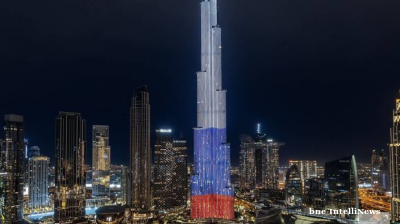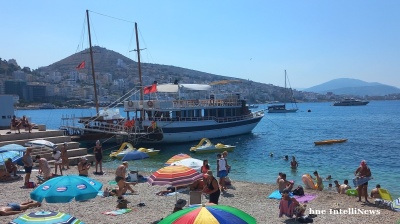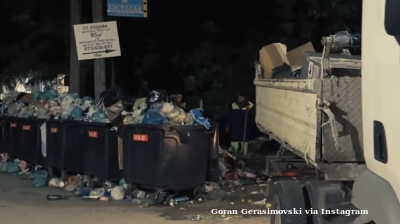Macedonians are increasingly looking to invest in real estate to protect the value of their money amid high inflation and financial uncertainty, a trend that has pushed up prices in the capital Skopje. As inflation erodes the value of savings, investing in real estate has become the preferred alternative.
Rising prices haven’t dented the demand for newly built apartments in Skopje, which has become an attractive destination for both investors and homebuyers seeking long-term security and value, real estate professionals said at the Real Estate Conference held in Skopje in May.
“The demand for apartments in Skopje is really high, which is a complex issue,” Aleksandar Ivanovski, owner of Porta Engineering Group told the conference co-hosted by Fortonmka, the exclusive affiliate partner of the global real estate services firm Cushman & Wakefield in North Macedonia.
Price rises unnerve buyers
High prices are good news for investors, but buyers are fearful of excessive price hikes that could make it harder for them to enter the market.
Over the past two years, the price of apartments in Skopje, particularly in the city centre and other desirable districts, has experienced a significant surge, reaching as high as €2,000 per square metre (sqm). For comparison, the net wage was around €570 in March this year.
Apartment prices are influenced by factors such as location, construction quality and comfort, but the minimum starting price is €1,000 per sqm.
North Macedonia’s central bank reported a significant surge in the house price index during 2022. The index recorded a remarkable increase of nearly 21%, marking the highest annual growth since 2008.
In comparison, the annual increases in 2021, 2020, 2019 and 2018 were 11.2%, 1.8%, 3.5% and 1.6% respectively — though when taking inflation into account, the growth in house prices in 2022 becomes much more subdued.
For the whole of 2022, the average inflation in North Macedonia was 14.2%, up from just 3.2% in 2021.
Since then, inflation has slowed, dropping back to 13% in April 2023. The central bank recently projected a slowdown in inflation to just 8-9% this year. The decline is attributed to assumptions of reduced energy prices and a gradual easing of price pressures in the food sector.
Saso Cvetkovski, the head of the housing department at Fortonmka, said that based on the firm’s analyses, it is likely that a slight decrease in demand can be expected in the medium term, particularly with the implementation of tighter monetary policies and increased interest rates.
In May, North Macedonia's central bank, the NBRM, raised its policy rate by 0.25 percentage points (pp), to 5.75%. That continues the monetary tightening that commenced in April 2022.
Lack of alternatives
With an underdeveloped local capital market, there are few alternatives for Macedonians to invest into.
Ivanovski said at the panel discussion that when considering the current global landscape, which includes factors such as inflation and financial insecurity, it becomes evident that people in Skopje are becoming more cautious with their finances. An illustration of this is the substantial amount of household deposits within local banks.
According to the latest central bank data, household deposits totaled MKD329bn (€5.3bn) at the end of April, 8.3% higher y/y.
But while savings have risen, savers are seeing their deposits eroded by inflation and there are also concerns related to the security of the banking system. According to Ivanovski, the collapse of local Eurostandard Bank, coupled with banks’ failure to adequately compensate depositors for inflation through higher interest rates, has further fueled the inclination towards real estate investments.
Cvetkovski, who is responsible for sales of apartments in four skyscrapers in Skopje’s Aerodrom neighbourhood, known as the Djevahir complex, acknowledges the stability of housing demand in the country.
“Despite a statistical increase in the price of apartments by 20%, the demand did not record a drastic drop, but remained at a stable level,” Cvetkovski said.
Ivanovski asserts that this strong demand is primarily driven by the desire to protect against inflation and ensure the preservation of wealth. On top of the increase in prices driven by rising demand, there is also the rising costs of construction materials brought about by automation.
Behind the region
However, according to Ivanovski, real estate prices did not increase as drastically in North Macedonia as in other parts of the region.
In Serbia for example, Grbavica, a neighbourhood in Novi Sad, situated in the northern province of Vojvodina, has emerged as the undisputed champion as prices in this area can skyrocket to €4,000, according to media.
The prices of apartments in Serbia are also on an upward trend, driven by significant demand from Russians and Ukrainians who are moving to the country due to the ongoing Russian-Ukrainian war.
By contrast in North Macedonia, “We still stick with some realistic prices,” Ivanovski said.
He underlined that the most significant surge in apartment prices in Skopje occurred during the transition from the German mark to the euro in the early 2000s.
Quality over quantity
Previously, the primary focus in housing was on the size and number of rooms, with insulation ranking relatively low in importance. However, according to Velimir Petrovski, the sales director of Knauf, the priorities have shifted.
Comfort and sound thermal protection are now considered the most crucial factors when it comes to housing. This signifies a growing emphasis on creating living spaces that provide optimal comfort and energy efficiency.
There are a number of high-end housing developments going up in North Macedonia’s capital. The Gjorce Petrov neighbourhood in Skopje is set to undergo a significant transformation with the development of the Alexandria residential-commercial complex, a major investment by the local Karpos factory.
The complex spreads on an area of 150,000 sqm. Alongside residential buildings, the complex will include business buildings, public facilities, infrastructure and business centres.
Aleksandar Stefanov, a member of the management board of the Karpos factory, said at the conference that the project commenced five years ago, resulting in the construction of 700-800 apartments thus far.
The development aims to stay abreast of regional trends, ensuring that the complex offers the latest in modern living. In an effort to enhance the quality of life for residents, the factory intends to install a smart system within the apartments. This will introduce automatic control for lighting and garage access, resulting in a more convenient and comfortable living experience.
However, affordability is an issue for buyers too. Local investors want to introduce smart living technologies and more modern living conditions, but some buyers are less inclined to embrace these advances as they want to buy homes at a lower price.
Challenges for builders
Aside from the rise in prices of construction materials, builders have long struggled with lengthy building permit procedures and delays in urban planning, as pointed out by Fatmir Etemi, the owner of local ZSF KOM. Such procedures can take several years, a situation blamed on political parties and their decision-making, including the imposition of a construction moratorium.
“The administration should be more efficient,” Ademi said at the conference.
Martin Panovski, the architect behind the Grand Skopje project, highlighted the changing construction standards worldwide, particularly regarding energy efficiency. He suggested the importance of establishing a defined standard in North Macedonia to align with global practices.
On the other hand, in a move that has stimulated investment, the Law on Construction Land was enacted in 2008, giving foreign citizens and companies the opportunity to directly own land for construction purposes in North Macedonia.
Features

CEE needs a new growth model as FDI plunges
wiiw economist Richard Grieveson says the CEE region’s long-standing model of attracting FDI through low labour costs no longer works.
KSE: Ukraine is facing a $53bn budget shortfall, but economy is stable for now
Ukraine is in urgent need of additional financing from partners as the continuation of the war drives up defence spending and reconstruction needs, jeopardizes budget financing, weighs on the balance of payments, and slows economic growth.

PANNIER: Ruling family’s ‘palace in the sky’ cruel sight for Turkmenistan’s poor souls down below
Photos posted of renovated Boeing by US makeover manager offer further insight into "ultra-luxurious" world enjoyed by Berdimuhamedovs.

Russia tax service targets Russian accounts in UAE
The Russian Federal Tax Service (FTS) has ramped up its scrutiny of Russian nationals holding accounts in the United Arab Emirates, following the effective implementation of automatic tax information exchange between the two countries.




